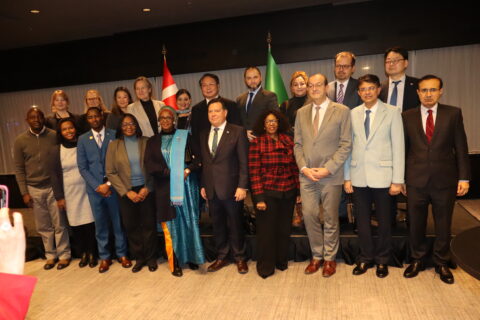Business Information
Business Information in Tanzania
Tanzania boasts a wealth of natural resources and diverse investment opportunities. The government has streamlined investment regulations to attract international investors, with oversight provided by the Tanzania Investment Centre (TIC). The TIC acts as a one-stop agency for all investment matters. Download the Tanzania Investment Guide to explore available opportunities.
Functions of the Tanzania Investment Centre (TIC)
- Promoting investment in Tanzania across various sectors.
- Addressing administrative challenges faced by local and foreign investors.
- Assisting with the establishment, registration, and setup processes for businesses.
- Helping investors obtain licenses, permits, visas, approvals, and necessary services.
- Securing investment sites, particularly for Export Processing Zone (EPZ) projects in agriculture, mining, infrastructure, fisheries, and tourism.
- Issuing Certificates of Incentives and guarantees for investments exceeding $500,000 for foreign and $100,000 for local investors or joint ventures.
- Providing up-to-date information on investment opportunities, benefits, and incentives.
- Facilitating collaboration between investors and key organizations like the Tanzania Chamber of Commerce, Industry, and Agriculture (TCCIA), Confederation of Tanzania Industries (CTI), Tanzania National Business Council (TNBC), and Tanzania Private Sector Foundation (TPSF).
For updates on business and investment in Tanzania, visit Tanzania Invest.
Trade in Tanzania
Trade plays a crucial role in Tanzania’s economic strategy, focusing on poverty reduction and economic transformation led by the private sector. The country offers a balanced package of trade incentives, particularly in manufacturing, agriculture, tourism, petroleum, gas, and mining. Import duties and VAT on capital goods and parts in priority sectors are zero-rated or deferred. Agricultural research expenses qualify for tax deductions, while capital acquisitions receive 100% tax deductions. Tanzania has signed double taxation treaties with countries like Denmark, India, Italy, and Sweden.
Key Investment Sectors
Leading sectors for investment include:
- Agriculture and Agro-based Industries
- Mining
- Petroleum and Gas
- Tourism
- Infrastructure
Priority Sectors for Investment
Targeted priority sectors include:
- Energy, Manufacturing, Agriculture, Chemical Industries
- Natural Resources (Fishing & Forestry)
- Construction and Real Estate
- Healthcare, Education, and Management Consultancy
- Broadcasting and Export-Oriented Projects
Trading Partners and Major Markets
Tanzania’s key trading partners include China, Germany, Japan, India, the European Union, the United Arab Emirates, the United Kingdom, Kenya, and South Africa. Primary commercial hubs in Tanzania include Dar es Salaam, Mwanza, Zanzibar, Arusha, Mbeya, Tanga, Kilimanjaro, and Kigoma.
Imports
Major import goods include agricultural machinery, industrial raw materials, transportation equipment, petroleum products, construction materials, and consumer goods.
Exports
Primary export commodities are minerals (gold, gemstones, diamonds, coal), coffee, cotton, cashew nuts, tea, sisal, tobacco, pyrethrum, and organic spices. For contacts on business licenses, partnerships, and exporting procedures, consult relevant product boards and trade organizations, such as the Tanzania Coffee Board, Tanzania Cashewnut Board, Tanzania Trade Development Authority, and Tanzania Chamber of Commerce, Agriculture, and Industries.
Investments Call Center
+255 734989470 | +255 734989471 | WHATSAPP +255 737879087 | +255 734989472
Potential Export Products from Tanzania
The Embassy of Tanzania in Sweden has identified the following products which have export potential in the Nordic, Baltic countries and Ukraine.
(i) Horticultural Products:
- We think the best possibility for trade in the agricultural sector lies in high-value horticultural products such as fresh fruits and vegetables.
(ii) Organic foods
- Specialized organic foods often fetch higher prices in Scandinavia and we think that such products from Tanzania are likely to find viable markets here and at a higher price level. Such products are Cashew nuts, groundnuts, Sesame seeds, Cotton, Coffee, Peper, Lemongrass, Ginger, Clove, Cardamon, Cinamon, Vanilla, Black Pepper, Turmeric, essential oils, Spice, Coconut, Tea, Paprika, Hibiscus, and Certified Organic Fruits
(iii) Seafood products
- The Nordic countries import the entire range of seafood that Tanzania has available for export.
- Greater sales from chilled fish and prawns could easily be achieved if suppliers are assisted in quality, packaging to meet delivery requirements.
- We think there could be an excellent market in the Nordic for Fish Lake, ocean, and crustaceans.
(iv) Floriculture
- The Nordic can easily be a great market for Tanzania
- Tanzania with the advantage of a warmer climate, high light levels and low labor costs could become an important cut flower exporter to the Nordic countries.
- As a cautionary note here, mistakes by a supplier or demonstration of unreliability could definitely result in loss of business as potential buyers could turn to alternative suppliers worldwide like Latin America, US, Australia, Israel, Madagascar, Comoros, New Zealand, Thailand.
(v) Non-perishable products
- Fruit juices, sun-dried fruits and mangoes in syrup could also enjoy a market in the Nordic countries.
- Processed food products have an easier time with health regulations.
- The strong condition here is that these food products must conform to international packaging and labeling standards.
(vi) Apparel and Textiles
- Small and medium exporters dealing with textiles could find market opportunities in the Nordic and Baltic Countries. The textile and clothing industry in Tanzania has the potential to become a significant sourcing location for foreign buyers.
- The Textile Development Unit (TDU) is promoting Tanzania as “the best overall location for making apparel in Africa”. Tanzania offers a sustainable supply of locally-grown handpicked cotton for Textile and Apparel brands, buyers and manufacturers.
For trade statistics and further details on trade in Tanzania, please contact
Permanent Secretary
Ministry of Industry, Trade and Marketing
P. O. Box 9503, Dar es Salaam, Tanzania.
Telephone: +255 22 2127898/97
Fax: +255 22 2125832
E-mail: ps@mit.go.tz
Website: https://www.mitm.go.tz
The Executive Director
Tanzania Investment Centre (TIC)
P. O. Box 938, Dar es Salaam, Tanzania.
Tel: +255 22 2116328 -31
Fax: +255 22 2118253
E-mail: information@tic.co.tz
website: https://www.tic.co.tz
Trade and Investments
Blog Feed
Public holiday
The Consulate of the United Republic of Tanzania will be closed on the following dates:…
24 December 2025 0Tanzania 64th Independence day celebration in Denmark
Thank you for joining us in celebrating the 64th anniversary of Tanzania’s independence. We Tanzanian’s…
11 December 2025 0

